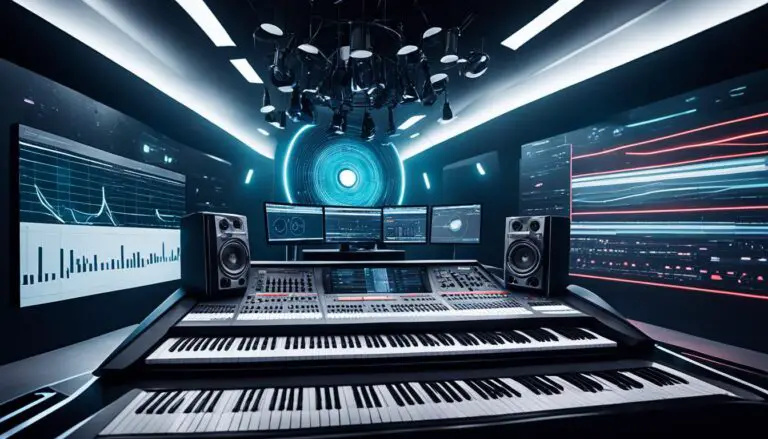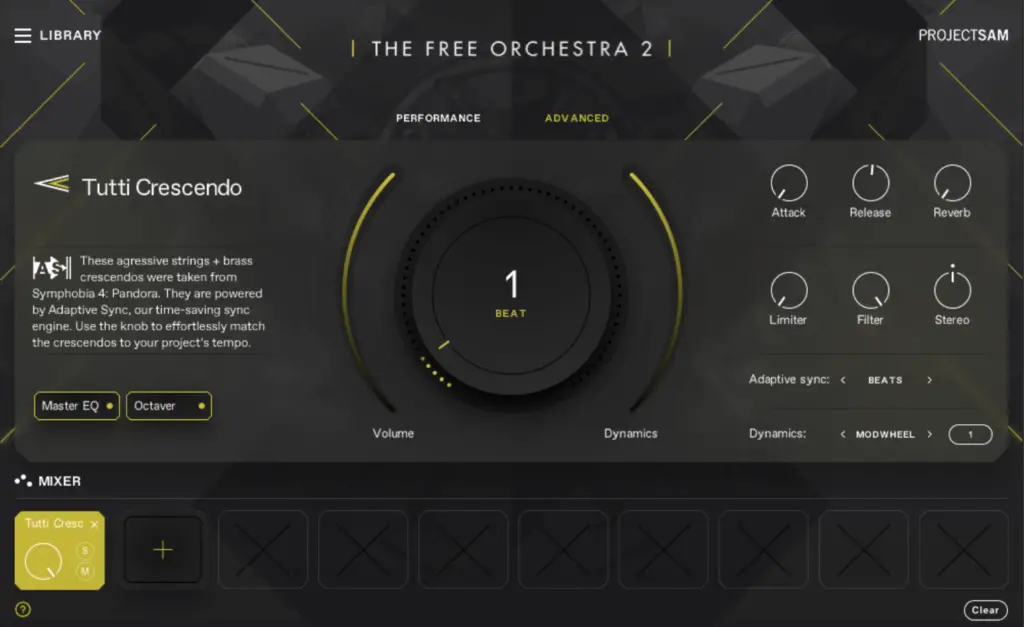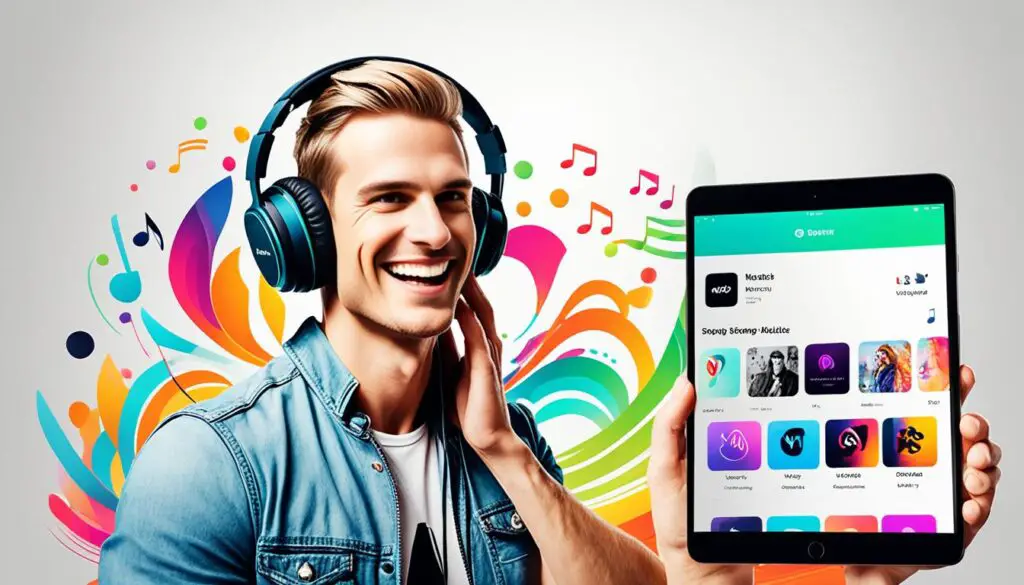At the University of Surrey, researchers are creating a special AI. This AI, called AudioLDM, changes written text into high-quality audio. It’s expected to make big changes in making music and sounds. It works fast and doesn’t need a lot of power.
AudioLDM is open-source. It uses a smart way called Contrastive Language-Audio Pretraining. This special method lets it learn from lots of different sounds without needing them to be labelled. This makes the AI very useful for many things. Like making movies, playing games, creating digital art, and helping people who can’t see well.
Key Takeaways
- Researchers at the University of Surrey are developing a text-to-audio AI model called AudioLDM that can generate high-quality audio clips from text prompts.
- The open-source AudioLDM model is built using a semi-supervised method called Contrastive Language-Audio Pretraining (CLAP), which enables it to be trained on vast amounts of diverse audio data without the need for text labelling.
- AudioLDM has a user-friendly interface and the ability to create new sounds without retraining, making it a versatile tool for a wide range of applications, including filmmaking, gaming, digital art, and assistive technology for the visually impaired.
- The generative AI system has the potential to revolutionise the music and sound creation industries by producing unique audio samples in seconds with minimal computing power.
- The advancements in audio AI offer exciting opportunities for the UK’s creative industries to transform the way sound is produced and experienced.
Generative AI Inspiring Creativity in Music
At the University of Surrey, a tool called AudioLDM is making waves in the ai music and audio processing world. It lets people turn words into high-quality music. This changes how we think about creating music and sounds. AudioLDM is easy to use, even if you’re not a music expert.
Introducing AudioLDM: A Text-to-Audio AI Model
AudioLDM does something special. It makes music without needing lots of computer power. Plus, it sounds great and is easy to control. It uses a smart method called CLAP. This lets it learn from lots of different sounds without needing a ton of text labels. So, it can make all kinds of music with ease.
User-Friendly Interface for Sound Creation
The way you use AudioLDM is simple and fun. This helps everyone, from experts to beginners in computer music. Now, even you can create music. It helps unleash new creativity, allowing anyone to dive into making music with just a click.
Applications in Filmmaking, Gaming, and Digital Art
AudioLDM is not just for making music. It’s also great for movies, games, and digital art. People in these jobs use it to make their work sound better. It makes sounds for games, stories, and online worlds more real. It even helps the visually impaired work with sound more easily.
Revolutionising the Music Industry
AI-powered music creation tools like Suno, Udio, and ElevenLabs are changing the music scene. They are making it easier for new musicians to join in. These tools help users create music, providing guidance and generating basic tracks. They are easy to use, even for total beginners.
Lower Barriers to Entry for Novice Musicians
AI tools are boosting the creativity of new musicians. With easy-to-use interfaces, these tools guide you through making music. They’re designed for people who love music but might not know much about how to create it. This opens music making to more people.
Affordable Custom Music for Marketers
These AI tools are also great for marketers. They make it easy and cost-effective to create music that fits ads perfectly. This cuts the time and money spent on getting music from publishers. Advertisers can now easily get music that perfectly matches their ads, helping make their campaigns stand out.

ai music, udio: Game-Changing Tools for Different Industries
AI tools like Suno, Udio, and ElevenLabs are changing more than music. They’re making big waves in the casino world. These apps help make exciting sounds for casinos, from soundscapes to catchy jingles.
Streamlining Sound Design for Casinos
Creating complex sounds was slow and costly for experts. But now, AI tools from Suno, Udio, and ElevenLabs can cut these costs for casino games. And they make sounds more personal and quick to react to what’s happening in the games.
Dynamic Music Generation for Video Games
Video game makers are also jumping on the AI bandwagon. Tools like Udio can create music that changes with the action and story of the game. This makes the game sounds more alive and fun for players.
The Power of AI in Audio Processing
AI tech is changing how we process audio, opening up new ways to improve sound. Industry experts say AI makes signal processing better, giving us more precise audio. It uses machine learning algorithms to work with sound waves. This lets us do things like cut out background noise, adjust the volume range, and balance the sound.
Improved Audio Signal Processing Techniques
AI-powered audio processing is a game-changer for how we handle sound. It uses machine learning algorithms to fine-tune audio. Now, we can reduce noise, balance dynamic range, and change the sound quality more precisely than we could before.
Enhancing Sound Quality with AI
The use of AI technology in audio means we now have smart tools to make sound better. For instance, there are intelligent noise reduction tools that can find and cut out background noise. Then there’s equalization and compression that smooth out sound. These AI tools are changing how we create and improve audio.

Algorithmic Composition and Sound Synthesis
AI music tools are changing how we make music. They can create new melodies and harmonies using special algorithms. These algorithms learn from lots of music to find patterns and rules. Then, they use this knowledge to make new music that’s both original and follows music theory.
Generating Unique Melodies and Harmonies
AI tools create fresh music by learning from existing songs. They use complex algorithms to come up with new melodies and harmonies. These new pieces combine tradition with innovation, opening doors for musicians and composers to explore.
Realistic Sound Textures with AI
AI also helps make realistic, complex sound textures. It mimics how sounds are created in nature with tools like the Physarum simulation. This brings a new level of depth to sound design, offering rich, organic sounds that weren’t possible before.
Generative Music: A New Era of Computer Music
AI-powered tools are changing music creation, starting a new era of computer music. These systems use smart algorithms and learn on their own. They make fresh musical pieces that go beyond what people usually make.
Generative AI is based on neural networks, which work like our brains. They can handle a huge number of tasks, like the brain does. The use of Generative Pre-trained Transformers (GPTs) marks a big step forward. Now these systems can make music that’s more complex and rich.
These AI systems combine algorithmic composition and sound synthesis in a new way. They learn from lots of music to find patterns and rules. Then, they make new music, from melodies to realistic sounds. This marks a big change in generative music and computer music.
As AI tools become better and more available, they change the music scene. They let more people get into creating music with AI. This is making audio AI more popular, giving everyone a chance to make machine-made music.
Ethical Considerations in AI Music Creation
Advancements in AI music tools bring new chances but also ethical dilemmas. Copyright and intellectual property rights are key. As AI makes original music, who owns and uses these songs is in doubt. It’s vital to deal with these issues fairly so that artists and composers are respected.
Addressing Copyright and Intellectual Property Concerns
AI’s entry into music sparks debates about copyrights. When AI makes a song, it’s unclear who owns it. This gets complex when AI songs sound just like human-made ones. To clear this up, AI developers, musicians, and policymakers need to work together. They must set fair rules to protect everyone’s interests in the AI music scene.
Ensuring Fair Compensation for Artists
AI’s role in creating music involves treating artists fairly. Those who train AI models must get paid fairly. As AI gets better at making music, the original artists should be paid well. This includes good contracts, sharing profits, and clear reporting to support artists’ rights.
Dealing with the ethics of audio AI and music creation is key. It will be important as these tools grow in the UK’s music world. By solving copyright issues and ensuring fair pay, AI developers can aid a balanced environment. Here, both people and AI can make music together in peace.
The Future of Audio AI in the UK
The UK is becoming a hotspot for audio AI innovation. The prospects for this technology are bright. Researchers and developers are diving into new applications and research areas. These efforts aim to change the audio world even more.
Emerging Applications and Research Directions
Researchers are focusing on creating ai music and audio processing systems. These systems turn text prompts into high-quality music generation and sound synthesis. The University of Surrey’s AudioLDM is making waves. This model uses audio signal processing to craft stunning generative music and computer music.
They are also working on improving audio ai and digital signal processing. This means better sound quality, less noise, and smarter audio analysis. These improvements are key for fields like gaming, virtual reality, and assistive tech for the visually impaired.
Fostering Innovation in the Audio Industry
| Organisation | Focus |
|---|---|
| Innovate UK | Supports partnerships with disruptive startups and Queen Mary’s Centre for Digital Music to increase real-world impact from research. |
| AudioStrip | Specializes in music source separation technology using advanced machine-learning algorithms. |
| RoEx | A Queen Mary spinout aiming to democratize music production through AI-powered mixing. |
| Session | Founded by musicians and songwriters, including ABBA’s Björn Ulvaeus, and collaborates with Queen Mary to develop generative-AI creator tools for songwriters and musicians. |
| Stage | In collaboration with Session, designs cloud-native data platforms to ensure music creators receive credits and royalties accurately and transparently. |
| Connex | A project by Stage and Session that will revolutionize how record labels share credits data with enhanced speed, efficiency, quality, and security. |
These examples highlight the UK’s dedication to driving audio industry innovation. They’re focusing on ai music, audio processing, and more. This commitment aims to bring real change powered by audio ai and digital technologies.
Conclusion
AI is revolutionising how we make music and audio, not just in the UK but around the world. For example, tools such as AudioLDM are changing how we think about creating music. They make it easier to start, help creative people make their work quicker, and introduce new ideas to music makers and sound professionals.
Udio, a platform led by ex-Google DeepMind experts and supported by key investors, is leading this transformation. It can make a 30-second preview in 40 seconds, including everything from the music to the words. This means anyone, whether new or experienced, can venture into creating music in new and exciting ways.
Udio combines easy-to-use features with strong AI. This shows a big change in the music world towards AI-driven creation. In the UK, which is a hotspot for audio AI development, the future of this technology looks bright. It promises new ways to make sounds as new uses and studies in the field grow.
FAQ
What is AudioLDM?
What are the features and benefits of AudioLDM?
How does AudioLDM work?
What are the emerging AI-powered music creation tools?
How are AI-powered music creation tools benefiting other industries?
How are AI technologies improving audio processing?
What are the advancements in algorithmic composition and sound synthesis?
How are AI-powered music creation tools transforming the creative landscape?
What are the ethical considerations surrounding AI-powered music creation?
What is the future outlook for audio AI in the UK?
Source Links
- https://www.moshville.co.uk/news/2024/05/from-sounds-to-hits-ais-role-in-modern-music-production/
- https://www.clearviewsound.co.uk/post/ai-generated-music-the-next-frontier
- https://www.thecreativepenn.com/2024/04/15/generative-ai-impact-on-creativity-and-business-in-the-music-industry-with-tristra-newyear-yeager/
- https://www.linkedin.com/pulse/ai-music-achieves-its-milestone-moment-thanks-udio-hvjhe?trk=public_post
- https://medium.com/@sarthaksinghal93/how-generative-ai-is-revolutionising-the-music-industry-492df3c95fe5
- https://www.side-line.com/udio-ai-music-tool-will-revolutionize-the-industrial-music-industry-available-now/
- https://www.linkedin.com/pulse/revolutionizing-music-creation-udio-future-ai-audio-ariel-perets-g4vmf
- https://www.brayandkrais.com/stem-separating-ai-is-revolutionising-the-music-industry/
- https://udioai.ai/blog/overview-of-udio-ai-music-generator
- https://medium.com/@alpha-polymath/udio-ai-music-revolutionizing-music-creation-with-the-power-of-ai-937b722d031b
- https://medium.com/@trackinsolo/unleashing-the-power-of-ai-exploring-the-inner-workings-of-ai-assisted-audio-production-f45fd09b1bbe
- https://darkhorseinstitute.com/unleashing-the-power-of-ai-in-music-production/
- https://blog.hubspot.com/marketing/audio-ai
- https://softwarelinkers.in/post/ai-music-algorithmic-composition-and-sound-synthesis
- https://aimc2023.pubpub.org/pub/7zvfxnal
- https://www.linkedin.com/pulse/evolution-generative-ai-music-kelli-richards-9wfic
- https://www.soundingfuture.com/en/article/dawn-ai-assisted-music-creation-embracing-future-generative-ai
- https://medium.com/plan-it-for-me-pifm/music-3-0-the-new-revolution-with-generative-ai-c3f2c70477a9
- https://medium.com/@othilia.norell/ai-in-music-creation-and-the-ethical-challenges-of-it-c20d7fae6adf
- https://fortune.com/2024/04/29/ai-music-revolution-sets-stage-for-dataset-ethics/
- https://www.linkedin.com/pulse/ethical-considerations-ai-music-creation-dan-jones-p6ose
- https://www.qmul.ac.uk/media/news/2024/se/ai-in-music-queen-mary-begins-new-research-partnerships-.html
- https://www.pgmusic.com/forums/ubbthreads.php?ubb=showflat&Number=809858
- https://www.sae.edu/gbr/insights/the-future-of-ai-in-audio-production-enhancement-or-replacement/
- https://udioai.ai/blog/ai-driven-music-the-revolutionary-arrival-of-udio-ai



